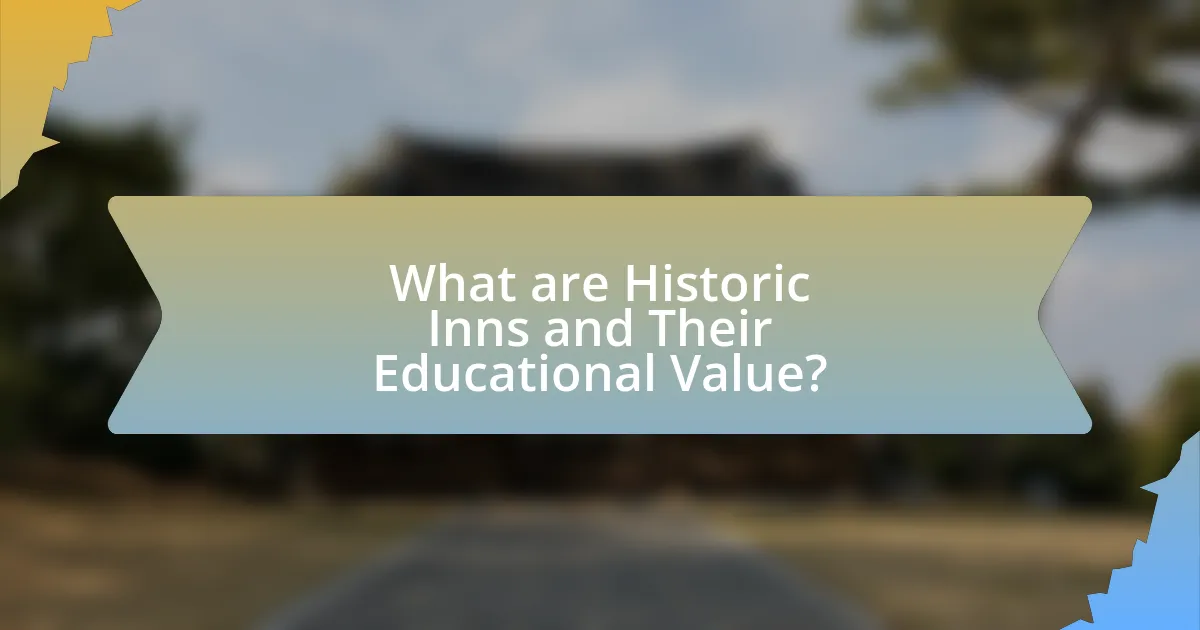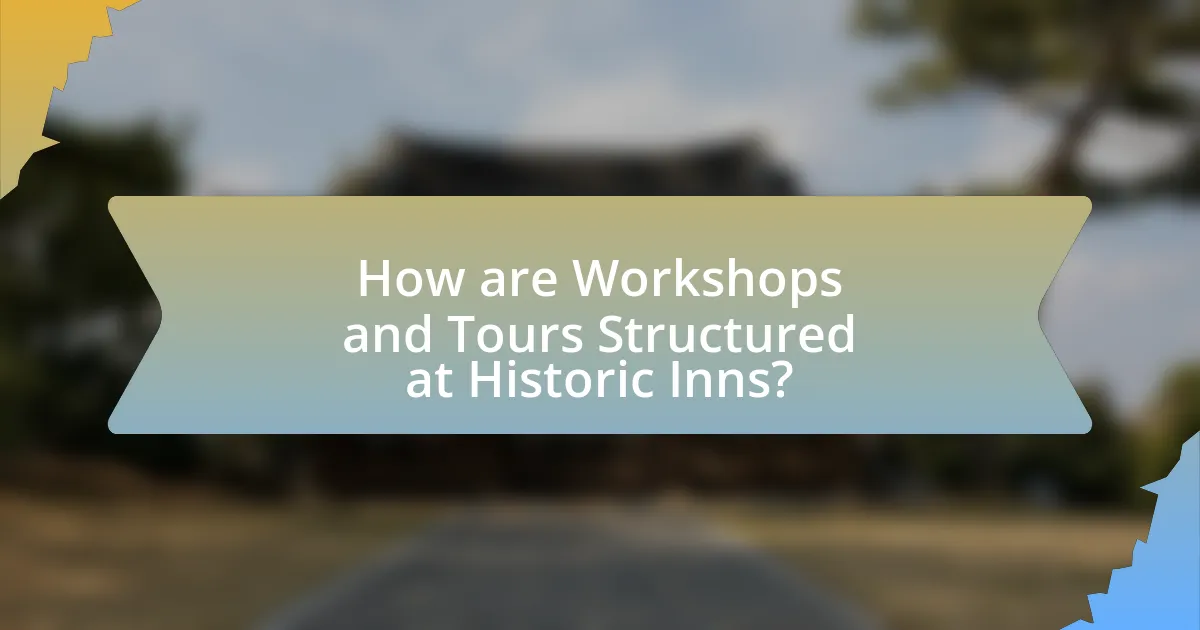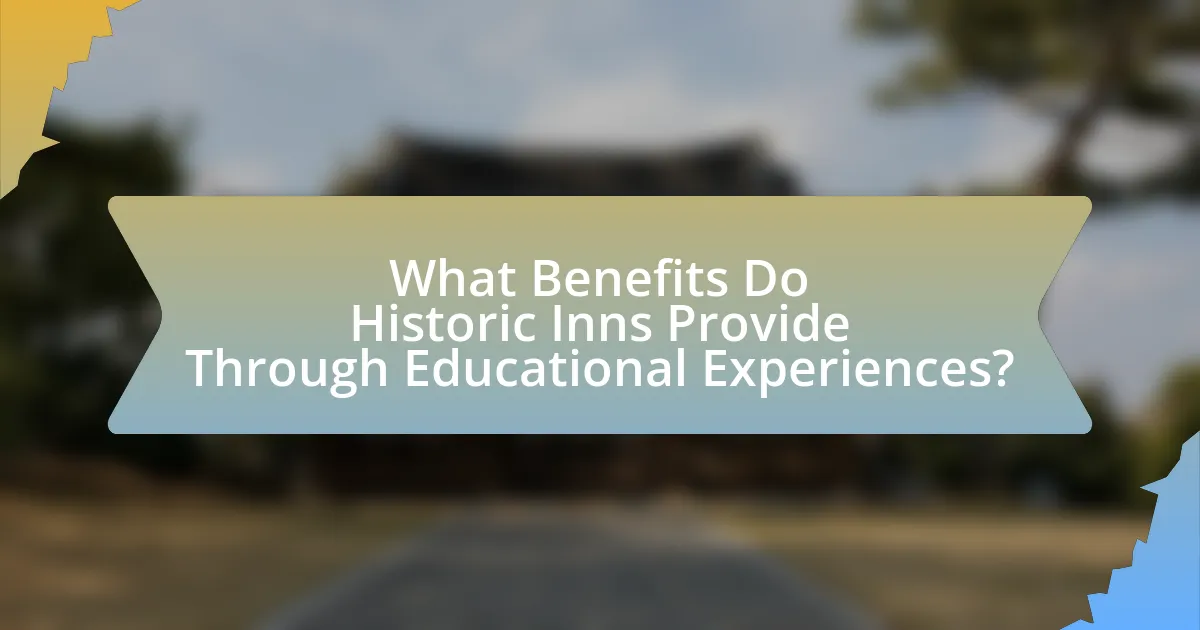Historic inns are accommodations of historical significance that provide educational experiences through workshops and guided tours. These establishments offer immersive opportunities for visitors to learn about local history, architecture, and cultural practices, often featuring preserved artifacts and hands-on activities. Workshops may include traditional crafts and cooking classes, while tours provide insights into the inn’s historical context and notable events. By engaging with the past, participants gain a deeper appreciation for local heritage, fostering community engagement and enhancing tourism in the region.

What are Historic Inns and Their Educational Value?
Historic inns are accommodations that have historical significance, often reflecting the architectural styles, cultural practices, and social histories of their time. Their educational value lies in providing immersive experiences that allow visitors to learn about local history, heritage, and traditions through guided tours, workshops, and interactive exhibits. For example, many historic inns offer workshops on traditional crafts or cooking methods that were prevalent during their operational years, thereby enhancing understanding of the past. Additionally, these inns often serve as venues for historical reenactments or lectures, further enriching the educational experience by connecting guests with the historical narratives of the region.
How do Historic Inns serve as educational experiences?
Historic inns serve as educational experiences by providing immersive opportunities to learn about local history, architecture, and culture. These establishments often feature preserved artifacts, guided tours, and workshops that highlight the historical significance of the inn and its surroundings. For example, many historic inns offer workshops on traditional crafts or cooking methods that reflect the region’s heritage, allowing visitors to engage directly with the past. Additionally, guided tours often include storytelling that connects guests with the historical events and figures associated with the inn, enhancing their understanding of the local context. This combination of hands-on learning and narrative history makes historic inns valuable educational resources.
What historical significance do Historic Inns hold?
Historic Inns hold significant historical value as they often serve as preserved examples of architectural styles and cultural practices from specific periods. These establishments frequently played crucial roles in local history, acting as gathering places for travelers, politicians, and community events, which contributed to the social and economic development of their regions. For instance, many Historic Inns were built during the colonial era and reflect the craftsmanship and materials of that time, providing insights into the lifestyle and hospitality practices of past generations. Their preservation allows for educational opportunities, enabling visitors to engage with history through guided tours and workshops that highlight their unique stories and contributions to the community.
How do Historic Inns contribute to local culture and heritage?
Historic inns contribute to local culture and heritage by serving as living museums that preserve and showcase the history, architecture, and traditions of their regions. These establishments often feature original furnishings, artifacts, and decor that reflect the local historical context, allowing visitors to experience the cultural narrative firsthand. For example, many historic inns host guided tours and workshops that educate guests about traditional crafts, culinary practices, and historical events specific to the area, thereby fostering a deeper appreciation for local heritage. Additionally, historic inns frequently collaborate with local artisans and historians, further embedding themselves in the community and enhancing cultural continuity.
What types of workshops are offered at Historic Inns?
Historic Inns offer a variety of workshops focused on historical education and hands-on experiences. These workshops typically include topics such as traditional crafts, cooking classes featuring historical recipes, and guided tours that delve into the history and architecture of the inns themselves. For example, some inns may host workshops on period-specific crafts like candle making or quilting, which reflect the historical practices of the time. Additionally, culinary workshops often explore the regional cuisine of the era, providing participants with a taste of history.
What skills can participants learn through these workshops?
Participants can learn skills such as historical research, storytelling, and hospitality management through these workshops. Historical research skills enable participants to gather and analyze information about the inns’ past, enhancing their understanding of local heritage. Storytelling skills are developed as participants learn to convey engaging narratives about the history and significance of the inns, which is crucial for tours and presentations. Additionally, hospitality management skills are cultivated, as participants gain insights into customer service, event planning, and operational aspects of running an inn, which are essential for creating memorable guest experiences.
How are workshops tailored to different age groups and interests?
Workshops are tailored to different age groups and interests by customizing content, delivery methods, and activities to suit the specific needs and preferences of participants. For example, workshops for children often incorporate interactive games and hands-on activities to maintain engagement, while those for adults may focus on in-depth discussions and practical applications relevant to their interests. Additionally, facilitators assess the participants’ backgrounds and preferences through surveys or preliminary discussions, allowing for adjustments in the workshop structure. This targeted approach ensures that the educational experiences provided in historic inns resonate with diverse audiences, enhancing learning outcomes and participant satisfaction.
What role do tours play in the educational experience at Historic Inns?
Tours at Historic Inns serve as a vital component of the educational experience by providing immersive insights into the history, architecture, and cultural significance of the properties. These guided experiences allow visitors to engage with historical narratives and learn about the unique stories associated with each inn, enhancing their understanding of the local heritage. For instance, many Historic Inns feature artifacts and original furnishings that reflect the period in which they were built, offering tangible connections to the past. Additionally, knowledgeable guides often share anecdotes and historical context that enrich the visitor’s experience, making the learning process both engaging and informative.
What are the key features of guided tours at Historic Inns?
Guided tours at Historic Inns typically feature knowledgeable guides who provide in-depth historical context about the inn’s architecture, significant events, and notable guests. These tours often include access to areas not open to the general public, allowing visitors to experience the inn’s unique heritage firsthand. Additionally, guided tours may incorporate storytelling elements that enhance the educational experience, making history engaging and relatable. Many Historic Inns also offer themed tours that focus on specific aspects, such as local culture or historical figures, further enriching the visitor’s understanding of the site’s significance.
How do tours enhance the understanding of historical contexts?
Tours enhance the understanding of historical contexts by providing immersive experiences that connect participants directly with the past. Engaging with historical sites, artifacts, and narratives during tours allows individuals to contextualize events and cultures in a tangible way. For example, guided tours of historic inns often include storytelling that highlights significant events, local customs, and the lives of notable figures, thereby enriching the visitor’s comprehension of the era. Research indicates that experiential learning, such as that found in tours, significantly improves retention of historical information, as participants are more likely to remember details when they can visualize and interact with the environment.

How are Workshops and Tours Structured at Historic Inns?
Workshops and tours at historic inns are typically structured to provide immersive educational experiences that highlight the history and culture of the location. These programs often include guided tours led by knowledgeable staff who share insights about the inn’s architecture, historical significance, and notable events. Workshops may focus on traditional crafts, cooking, or local history, allowing participants to engage hands-on with the subject matter. For example, a historic inn might offer a cooking workshop featuring recipes from the era in which the inn was built, enhancing the educational aspect by connecting culinary practices to historical context. This structured approach not only educates participants but also fosters a deeper appreciation for the heritage of the inn and its surroundings.
What is the typical format of workshops at Historic Inns?
The typical format of workshops at Historic Inns includes a combination of hands-on activities, guided discussions, and historical presentations. These workshops are designed to engage participants in the history and culture of the inn, often featuring local artisans or historians who provide insights into traditional crafts or historical events relevant to the area. For example, a workshop might involve participants learning about colonial cooking techniques while preparing a meal using recipes from the period, thereby offering an immersive educational experience that connects them to the inn’s heritage.
How long do workshops usually last, and what is included?
Workshops typically last between two to four hours. These sessions usually include hands-on activities, instructional materials, and opportunities for participant interaction, often focusing on specific skills or knowledge related to the historic context of the inn. For example, a workshop on traditional cooking methods may involve a cooking demonstration, tasting samples, and a discussion of historical recipes.
What materials or resources are provided during workshops?
Workshops typically provide participants with educational materials such as handouts, guides, and reference books related to the workshop topic. Additionally, resources may include tools or equipment necessary for hands-on activities, as well as access to online platforms for further learning. These materials are designed to enhance the learning experience and facilitate practical application of the concepts discussed during the workshop.
How are tours organized at Historic Inns?
Tours at Historic Inns are organized through a structured schedule that includes guided experiences led by knowledgeable staff. These tours typically highlight the historical significance of the inn, architectural features, and notable events associated with the location. For instance, many Historic Inns offer themed tours that focus on specific eras or events, providing visitors with an immersive educational experience. Additionally, reservations may be required, and group sizes are often limited to enhance engagement and interaction. This organization ensures that guests receive a comprehensive understanding of the inn’s history and cultural relevance.
What are the different types of tours available?
Different types of tours available include guided tours, self-guided tours, educational tours, and specialty tours. Guided tours involve a knowledgeable leader who provides insights and context, enhancing the experience with historical facts and anecdotes. Self-guided tours allow individuals to explore at their own pace, often using maps or apps for navigation. Educational tours focus on learning, often incorporating workshops or lectures, while specialty tours cater to specific interests, such as culinary, art, or adventure themes. Each type of tour offers unique experiences tailored to various preferences and learning styles.
How do tour guides prepare for their roles?
Tour guides prepare for their roles by conducting thorough research on the historical and cultural significance of the sites they will be presenting. This preparation includes studying the history, architecture, and notable events related to the historic inns, as well as understanding the audience’s interests to tailor the tour experience. For instance, guides often utilize resources such as historical texts, local archives, and expert interviews to gather accurate information, ensuring they can provide engaging and informative narratives during the tours.

What Benefits Do Historic Inns Provide Through Educational Experiences?
Historic inns provide significant benefits through educational experiences by offering immersive learning opportunities that connect guests with local history and culture. These establishments often host workshops, guided tours, and historical reenactments that enhance visitors’ understanding of the region’s heritage. For example, many historic inns feature architecture and decor that reflect specific historical periods, allowing guests to experience the aesthetics and lifestyles of the past firsthand. Additionally, educational programs may include cooking classes that utilize traditional recipes, thereby preserving culinary history. Such experiences not only enrich the visitor’s knowledge but also promote cultural preservation and community engagement, making historic inns vital educational resources.
How do educational experiences at Historic Inns benefit participants?
Educational experiences at Historic Inns benefit participants by providing immersive learning opportunities that enhance historical knowledge and cultural appreciation. Participants engage in workshops and tours that focus on local history, architecture, and heritage, allowing them to connect with the past in a tangible way. For instance, hands-on activities such as cooking traditional recipes or participating in period reenactments deepen understanding and retention of historical facts. Research indicates that experiential learning, like that offered at Historic Inns, significantly improves knowledge retention compared to traditional classroom settings, making these experiences both educational and memorable.
What personal growth opportunities do these experiences offer?
Historic inns as educational experiences offer personal growth opportunities such as enhanced historical knowledge, improved social skills, and increased cultural awareness. Engaging in workshops and tours at these inns allows individuals to learn about local history and heritage, fostering a deeper understanding of their community. Additionally, participating in group activities promotes teamwork and communication, which are essential social skills. Research indicates that immersive learning experiences, like those offered at historic inns, can significantly enhance personal development by providing hands-on engagement with the subject matter, thereby reinforcing learning and retention.
How do educational experiences foster community engagement?
Educational experiences foster community engagement by providing opportunities for individuals to connect with local history and culture through interactive learning. Workshops and tours at historic inns allow participants to engage directly with their community’s heritage, enhancing their understanding and appreciation of local traditions. For instance, studies show that community-based educational programs can increase civic participation by 30%, as they encourage individuals to take an active role in preserving and promoting their local culture. This engagement not only strengthens community ties but also fosters a sense of belonging and responsibility among participants.
What impact do Historic Inns have on local tourism?
Historic inns significantly enhance local tourism by attracting visitors interested in cultural heritage and unique accommodations. These establishments often serve as focal points for historical education, offering workshops and tours that immerse guests in the local history and traditions. For instance, a study by the National Trust for Historic Preservation found that heritage tourism, which includes stays at historic inns, contributes over $192 billion annually to the U.S. economy, demonstrating the financial impact of such accommodations on local communities. Additionally, historic inns frequently collaborate with local businesses, further stimulating economic growth through increased foot traffic and visitor spending in surrounding areas.
How do educational workshops and tours attract visitors?
Educational workshops and tours attract visitors by offering immersive, hands-on experiences that enhance learning and engagement. These programs provide unique opportunities for participants to interact with historical contexts, fostering a deeper understanding of the subject matter. For instance, workshops at historic inns often include demonstrations of traditional crafts or cooking techniques, which not only educate but also create memorable experiences that encourage word-of-mouth promotion. Additionally, statistics show that experiential learning increases retention rates, making these workshops appealing to schools and families seeking educational outings.
What economic benefits do Historic Inns bring to their communities?
Historic inns provide significant economic benefits to their communities by attracting tourism, which stimulates local businesses. These establishments often serve as unique accommodations that draw visitors interested in history and culture, leading to increased spending in nearby restaurants, shops, and attractions. For instance, a study by the National Trust for Historic Preservation found that heritage tourism can generate up to $4.2 billion annually in the United States, highlighting the financial impact of historic inns on local economies. Additionally, historic inns often create jobs, both directly within the inn and indirectly through increased demand for local services, further contributing to economic growth in their communities.
What are some best practices for participating in workshops and tours at Historic Inns?
To effectively participate in workshops and tours at Historic Inns, attendees should prepare by researching the specific inn’s history and offerings. This preparation enhances engagement and understanding during the experience. Additionally, arriving on time is crucial, as many workshops and tours have set schedules that may not accommodate late arrivals. Actively participating by asking questions and sharing insights fosters a richer learning environment. Following any guidelines provided by the inn, such as respecting the property and adhering to safety protocols, ensures a positive experience for all. Lastly, taking notes can help retain valuable information shared during the sessions, making the experience more beneficial.